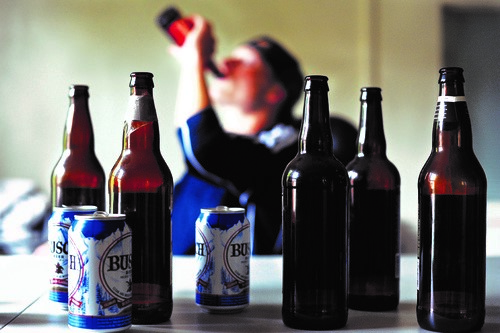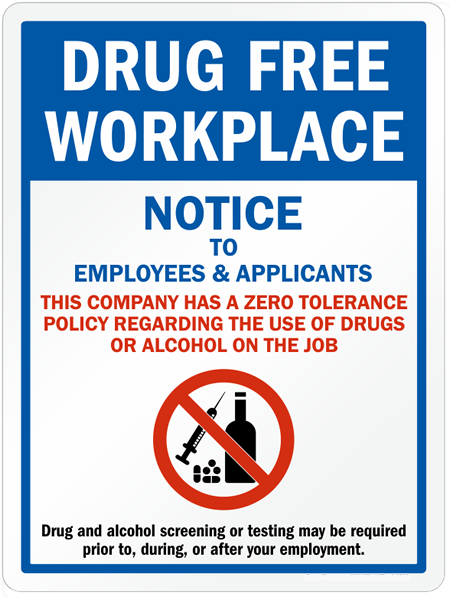Drug and Alcohol Use in the Construction Industry
A recent survey conducted by the Considerate Constructors Scheme (CCS) has found that the majority of UK construction workers are concerned about how drugs and alcohol effect their workforce. The survey, which included over 1200 participants found that 59% of them have concerns or issues related to drugs and alcohol in the workplace.

The survey also revealed that 35% of workers have witnessed their colleagues working under the influence of drugs or alcohol. Individuals who abuse drugs and alcohol increase the risk for accidents, lower the quality of work and drive up costs due to absenteeism, health issues and poor work quality.
Construction News reported last year that construction workers working on the new Tottenham Stadium were under the influence of alcohol and drugs on site. An anonymous source claimed “There were people off their heads, drinking cans first thing in the morning before going on to site and snorting cocaine in the toilets.” This just shows how rife drug and alcohol abuse is within the industry and that to some workers, this is just the norm.
The risks
Employee safety is at a high risk in the construction industry due to the nature of the work, it can be very dangerous. Statistically a construction worker is six times more likely to be killed at work than someone in other industries. Combine this with drug and alcohol abuse and this can only increase the dangers further, leading to an increase in workplace accidents and possible fatalities. The slightest lapse in attention or focus can cause serious consequences, especially where heavy machinery and vehicles are being used or when working up high.
There were 38 fatalities between 2017 and 2018 in the construction industry, according to provisional figures by the Health and Safety Executive. Falls from height were the most common cause of death, followed by being struck by moving vehicles or objects. NHS figures show that 20-30% of workplace accidents can be linked to alcohol in safety-critical industries such as construction.

Workers that choose to use drugs and alcohol not only put themselves at greater risk, but put others around them at greater risk too. Both colleagues and members of the public can suffer due to the actions of these people. Depending on what has been taken, the effects of drugs and alcohol can vary. However, the most common influences that can affect an individual in a working environment are:
- Impaired awareness including in vision and hearing
- Reduced concentration and ability to focus
- Diminished judgement and decision making
- Compromised balance and bad co-ordination
25% of participants of the CSS survey agreed that drugs or alcohol affected them at work through tiredness, and 23% agreed it affected them through decreased attention. Being alert, focused and aware are so important on a construction site where the slightest lapse in judgement can cause serious repercussions to an individual and others around them.
Being hungover at work can be almost as dangerous as being drunk at work. When hungover, people tend to be increasingly tired, they have decreased reaction times, are more un-coordinated and have a decreased attention span. Productivity levels also go down massively when someone is hungover, and absenteeism increases.
Impact on Health
It is not just the risks associated with drinking and using drugs at work but the increased risks it has on a person’s health. Alcohol and drug abuse are incredibly dangerous and are seriously detrimental to your health, they can lead to a number of serious health issues such as liver problems, pancreatitis, cardiovascular diseases, stomach ulcers, increased risk of cancer and even death. The World Health Organisation reported in 2015 that three million deaths annually are the result of harmful drug and alcohol use.
Economic Impact
Drug and alcohol misuse in the construction industry also has an economic impact. The National Institute for Health and Care Excellence reported that 17 million working days are lost a year in England due to alcohol-related sickness. This costs UK industry £7.3 billion a year. The increased health risks that come with drug and alcohol misuse can lead to workers having to take long periods of time off work. Workers are also much more likely to ring in sick to work if they are drunk, under the influence of drugs or hungover, due to the increased level of tiredness, feelings of nausea, dizziness and bad co-ordination and a fear of being caught.
Productivity is also decreased because people are more tired, work slower and have decreased attention span. The effects of drugs and alcohol can also lead to workers making costly mistakes and work having to be re-done or prolonged because of their misjudgement. Not being able to get a job done in the set amount of time will affect an employer financially, not to mention the costs of extra materials if a mistake is made. Employers also face a possible fine if accidents occur due to drug and alcohol misuse in the workplace.

Although it is not compulsory for employers in the construction industry to provide drug and alcohol testing to their employees, if an accident occurs because of misuse employers could face hefty fines or even be prosecuted. Employers have a duty of care to maintain a safe working environment under the Provisions of the Health and Safety at work Act. They can be personally liable for occupational accidents under the Corporate Manslaughter and Corporate Homicide Act 2007.
Why are workers misusing drugs and alcohol?
In a workforce that is predominantly male, there tends to be a macho culture widespread throughout the industry. Lots of men go for drinks after work or maybe in their lunch break and there is a pressure to be ‘one of the lads’ and join in. Often there is a level of competition, who can drink the most or who can go for the longest, and this leads to more people wanting to impress and join in. Drinking becomes part of the culture and when something becomes habit, this can lead to a problem and addiction.
Depression is closely linked with substance abuse. A lot of people drink and take drugs to numb the effects of mental illness, or as a coping mechanism. With the rates of mental illness so high within the industry, drug and alcohol abuse is likely pretty high too. Construction work is undoubtedly stressful, with long hours, heavy manual labour, working away from family and friends for long periods of time as well as the uncertainty of when and where their next job may be. Workers therefore may use drink and drugs to ease their stress after a long day at work, or even numb the physical pain caused by hours of manual labour. Once they start however, it can be hard to stop.

Under the CSS Code of Considerate Practice, employers are supposed to ‘Secure everyone’s safety’ by having systems that care for the safety of the public, visitors and the workforce, have initiatives for continuous safety improvement and embed attitudes and behaviours that enhance safety performance. Under the ‘Value their Workforce’ clause they are also supposed to care for the health and wellbeing of the workforce and provide and maintain high standards of welfare.
Allowing workers to be under the influence of alcohol or drugs in the workplace means that these clauses can not be upheld. Safety is massively compromised if just one person on a site is under the influence, especially if they are in a safety critical role. Those who consistently use and abuse drugs and alcohol tend to do it for a reason. Whether it be addiction, due to stress, or because of mental illness like depression. By determining that someone is misusing alcohol or drugs, you can then find out why. By doing this you can then get them the help they need, before it is too late.
More and more employers within the industry are seeing the benefits and necessity of drug and alcohol testing. Implementing drug and alcohol testing to all employees within the construction industry can seriously decrease the levels of drug and alcohol misuse in the workplace, and with it decrease the risks and economic impact associated with it. Regular testing of both new and prospective employees not only helps employers to uphold their health and safety obligations but can help them care for the wellbeing of employees too.

Introducing drug and alcohol testing has the benefit of reducing usage as it is often all that is needed to motivate drug and alcohol avoidance in all but the most resistant and dependent users. It acts as an extremely effective deterrent and enforces the idea that drug and alcohol misuse at work will not be tolerated. In the USA, research has found that there was a 51% reduction in work-related injuries within 2 years in companies who implemented drug and alcohol testing to existing and prospective employees. By implementing testing an employer will also be able to highlight anyone who may have a drug or alcohol problem who could need help and address their issues before it causes them or anyone around them harm.
Kays Medical can provide New Starter, For/with cause and Random drug and alcohol screening for your workplace. We can provide on-site test kits referred to as Point of Care Testing, which are quick and easy to undertake, and provide negative, all clear results within 10 minutes, so your employees can get back to work quickly. Contact us today for more information on drug and alcohol screening in the workplace, and what we can offer you to keep your staff safe.